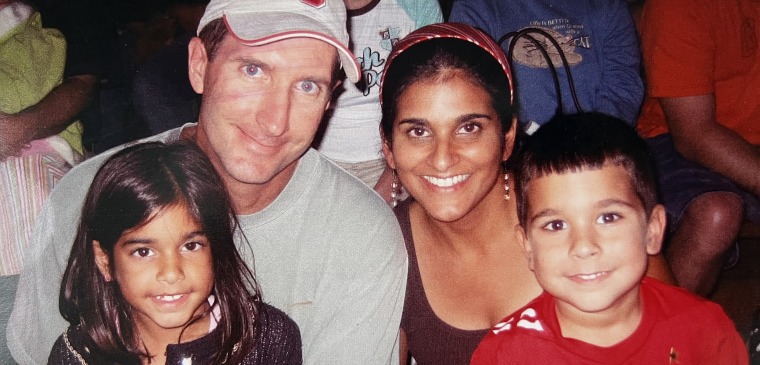When I married a guy from the Midwest — whose last name is actually White — I never thought that naming our mixed-race babies would be such a challenge. Just find a beautiful name that we both like that has a nice ring to it. Easy enough, right?
It turns out that picking an Indian name is a delicate art when you are raising the child in the U.S. with a non-Indian spouse or partner. Meaning and tradition are two factors that greatly influence Indian baby names. When naming our first child 24 years ago, I quickly realized there is another huge factor at play: pronunciation.
Not only did I want my non-Indian husband to properly pronounce the baby’s name, but I even anticipated the way a teacher would read it out loud in front of the whole class on the first day of school.
I even anticipated the way a teacher would read it out loud in front of the whole class on the first day of school.
I have plenty of baggage from having my Indian name mispronounced, even butchered. My parents gave me the name Kavita, which means “poetry.” Beautiful and even prescient, given that I made a career in words. But my parents also moved us to a small town in Oklahoma when I was 3. We were the first east Indian family to live there and our names did not exactly roll off the tongues of our neighbors.
It’s not their fault, given that Indian names often aren’t phonetically pronounced how they are spelled. While my parents call me “Ka-vee-tha,” with a hard “th” sound, that is not obvious since my name’s spelling has no “h” in it. (When I’ve asked them why they didn’t spell it as “Kavitha,” they say that you don’t need the "h," because everyone knows that’s the correct way to say it.)
Pronunciations ranged from Velveeta to Kaviter to Vita to Ka-veee-duh. To people who ask, “Why don’t you just correct people when they say it wrong?” I say: It gets SO tiresome.
My Oklahoma neighbors and friends had their own twists, further impacted by Southern, twangy accents. Pronunciations (and nicknames!) ranged from Velveeta to Kaviter to Vita to Ka-veee-duh. To those people who ask, “Why don’t you just correct people when they say it wrong?” I say: It gets SO tiresome. (This is why the Indian call center person will tell you his name is George, even when you know it’s probably Ganesh. Also, how many news stories did it take for people to learn how to properly pronounce Vice President Kamala Harris’ name? Too many.)
At age 9, my tennis coach deemed my name “too confusing,” so he just called me “K.” That has stuck as a nickname and that is what I tell the barista at Starbucks, although I make sure they don’t spell it “Kay” by saying, “It’s the initial K.”
So when I was pregnant with a baby girl, whose last name was going to be “White,” I was determined to find a name that had a precious meaning but an easy phonetic pronunciation.
My husband, Brian, and I spent months during my pregnancy drilling over names. While this was so that he could say the names with ease, it was also so that other non-Indians could as well. It would go like this: “Brian, how do you say A-n-u-s-h-k-a?” And he would say it in a way that made me cringe. “How do you say ‘P-a-r-v-a-t-i?” And he would say it ending with the "tee" sound rather than the correct “Par-va-thee.” (Everyone knows that’s the correct way to say it.)
It would go like this: “Brian, how do you say A-n-u-s-h-k-a?" And he would say it in a way that made me cringe.
Our short list of favorite names were all two-syllable, easy-to-spell names. The winner? Priya, which means “beloved,” and is pronounced right 99 percent of the time, even though her Starbucks cups sometimes have “Preeya” or “Pria.”
When our son was born a few years later, we drilled Indian baby boy names the same way. This time around, I knew to focus on the shorter, phonetically spelled names. To really hit it home for my sports editor husband, I wrote five story leads. Each started the same way, but with a different name.
“Sanjay White, of Fort Lauderdale, defeated Joe Smith, 6-0, 6-0, in the state tennis finals.”
“Shivan White, of Fort Lauderdale, defeated Joe Smith, 6-0, 6-0, in the state tennis finals.”
When it's my kid's name, I always correct people when they say it wrong.
The winner? Jayan, which means “victory.” While it is pronounced just as it looks — like you are saying J-N — people do love to make it sound fancier, by saying “Jay-Ahn,” or simpler, with the one-syllable “Jain.” Annoyingly, they confuse it with popular (non-Indian) names that sound similar: Jayden or Jalen. When it's my kid's name, I always correct people when they say it wrong.
Pamela Redmond, co-founder of the baby naming site Nameberry, points out that while it’s a challenge for all couples to agree on a name, “That challenge multiplies for parents of different backgrounds.”
“Feelings around names can be deeply rooted in other, larger considerations, such as family and spirituality,” Redmond said. “Finding one name that embodies all these factors from two highly diverse cultures — and making that a name you both like — can feel nearly impossible.”
When my daughter walked across the stage of her college graduation a few years ago, it was a thrill to hear “Priya White” over the loud speaker of her school's football stadium. My son's college graduation is coming up and I can't wait to hear his name called out. And if they pronounce “Jayan” accurately, I will consider it the ultimate ... victory.

